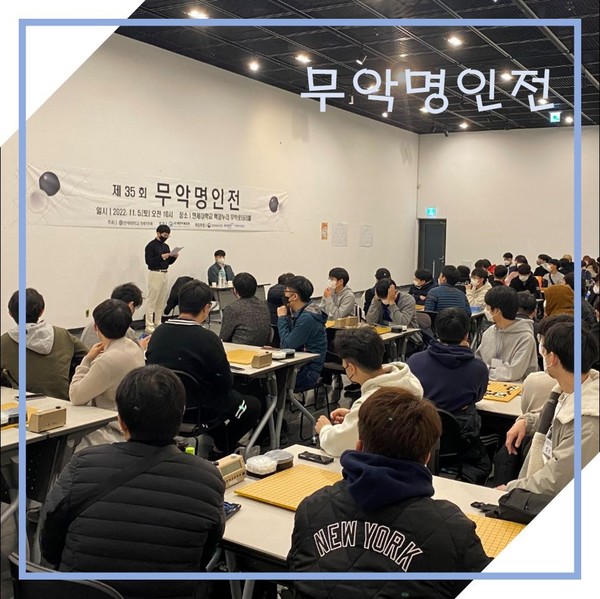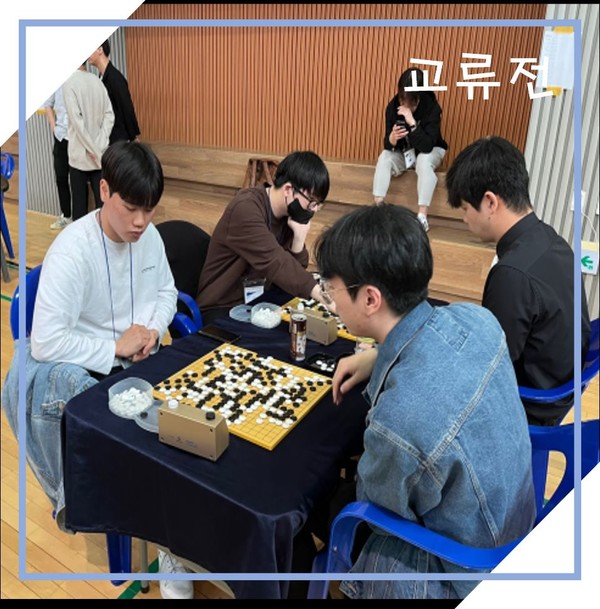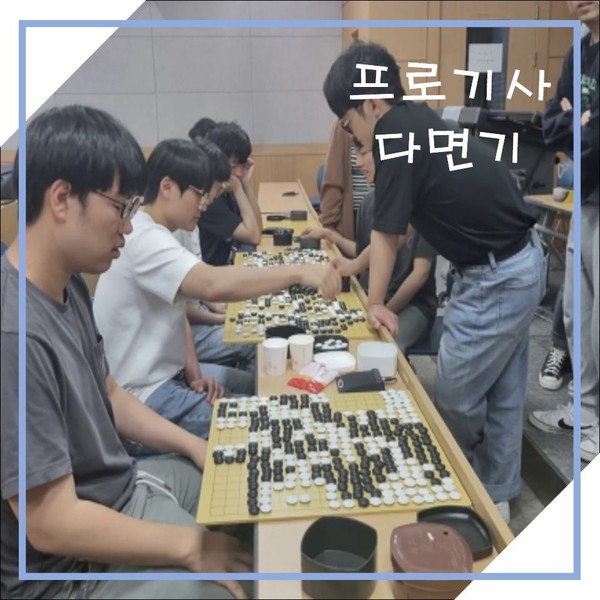An interview with Yonsei’s *ba-duk* club: *Giwoo-hoi*
GIWOO-HOI IS the one and only official ba-duk club in Yonsei University. Holding a long and rich history since its establishment in 1983, Giwoo-hoi is a community of Yonsei students who are interested in playing and learning ba-duk. Ba-duk, also known as "go," is an ancient strategy board game where two players place their stones of different colors, which are the playing pieces of each player, on a wooden board to claim more territory than the opponent. The Yonsei Annals invited Park Ji-hun (Sr., Dept. of English Language & Lit.) to introduce Giwoo-hoi and explore the fascinating world of ba-duk.
Annals: Can you briefly introduce Giwoo-hoi?
Park: The game of ba-duk has been a refined pastime of scholars from the ancient times of Korea, China, and Japan. As a means to preserve the long tradition and share the joy of playing ba-duk, the Yonsei ba-duk club, Giwoo-hoi was established on March 1, 1983. As a Yonsei-wide club open to students of all levels, from starters to advanced players, Giwoo-hoi welcomes all of those wishing to learn and play ba-duk.
Annals: What are Giwoo-hoi’s main activities?
Park: Giwoo-hoi holds various events on and off campus throughout the year. First, we hold weekly seminars to teach ba-duk to students of all levels. With the help of professional ba-duk players and high-skilled members of our club working as seminar instructors, we provide multilevel lectures ranging from beginner to advanced, where students get to play ba-duk with others at their level. Spinoff games such as Mafia ba-duk, Ba-duk soccer, Relay ba-duk, and Pair ba-duk are also held during the regular seminar sessions.
Giwoo-hoi also holds a Ba-duk League for the club members every semester. After the teams are assembled according to individual players’ levels, the teams get to compete and rank themselves through each match. The main activities of Giwoo-hoi aim to provide relaxing and socializing opportunities to our members, along with Member Trainings (MTs) and end-of-the-year parties.
Activities outside of the club include cheering events for the Korean Ba-duk League and Hanse Industrial Co. Cup University Federation, the Mu-ak Ba-duk Championship Series, and exchange games with partner universities. The Mu-ak Ba-duk Championship Series is a nationwide championship tournament annually held by Giwoo-hoi, sponsored by the Korea Baduk Association. The tournament presents a long history and tradition, as it has been held 37 times. Members of ba-duk clubs nationwide get to compete and interact. We also hold friendly exchange games with Keio University and domestic universities including Seoul National University, Korea University, Sogang University, Chung-Ang University, and the University of Seoul.



Annals: What are the basic rules of ba-duk game?
Park: Ba-duk is a strategic board game where players take turns in placing their stones on a 19 by 19 grid board. The aim of the players is to surround the opponent’s territory. The game rules are quite simple but ba-duk is still known for its strategic complexity.
1. Placing the stones: Players take turns placing the black or white stones in an unoccupied intersection.
2. Moving the stones: The stones can only move to adjacent empty points in either horizontal or vertical directions.
3. Capturing other’s stones: The purpose of the game is to surround and capture other’s stones and thus remove those from the board, or to surround one that is about to be placed.
4. Area scoring: The player who occupies a larger area wins the game.
Annals: What are the essential gaming mindsets of playing ba-duk?
Park: The most important part is to avoid being obsessed with the output of the game; rather, one should take the game as an opportunity to evaluate and develop their skills. Also, the essential qualities when playing the game are the abilities to analyze and play the game with perseverance, since it is a game where the situations can rapidly change in just a few moves. Making a careful move is necessary to prevent mistakes from happening in the first place; even so, there are times of inevitable missteps. Instead of mulling over the losses, one must constantly seek for a way to break the deadlock and overcome the challenges.
Annals: What do you think are the charms of playing ba-duk?
Park: Though ba-duk is a competition between the two players, the hidden charms of the game lie in showing respect to the other player. Also, that there is no one-size-fits-all strategy in winning the game is another characteristic that makes ba-duk fascinating. Players have to consider all the possibilities and set up new strategies for every match, according to the styles and mannerisms of the opponent. As a result, they can learn a lot from each game and never get tired of it.
Annals: Have you gone through any changes in your personality after joining the club?
Park: I used to be a quite short-sighted person, focusing more on immediate outcomes or profits. But as I played ba-duk with players far above my level, I realized that my obsession with the outcome of the game led to nothing but a sheer feeling of helplessness. Putting the stressful part aside, and through attempting to read the thoughts of my opponent, I felt as if we were having a conversation, rather than playing a game to win. That was when I learned to get a “kick” out of playing ba-duk and develop my skills, though it was quite a slow progress. In addition, when playing ba-duk many times, claiming a larger territory is much more crucial than capturing and killing others as the latter strategy hardly brings a long-term profit in the end. From playing ba-duk, I developed a habit of evaluating both short and long-term returns when making choices in my life.
Annals: Tell us about the most memorable moments you had as a member of Giwoo-hoi.
Park: I joined Giwoo-hoi in the second semester of 2022. I can recall the first seminar I attended. I was impressed by the warm welcome and hospitality of the members, instructors, and expert players, not to mention their detailed and professional explanations about ba-duk. The most memorable moment as the head of the club was when our club hosted the Mu-ak Ba-duk Championship Series. There were times when we were short-staffed in preparing for such a big event. I was impressed by the members who were not even in the management team but were still willing to volunteer, to conduct the event and manage the venue as if it were their duties. I would also like to thank our members who always understand and help me out, and I truly appreciate their contributions to creating such a friendly environment in Giwoo-hoi.

